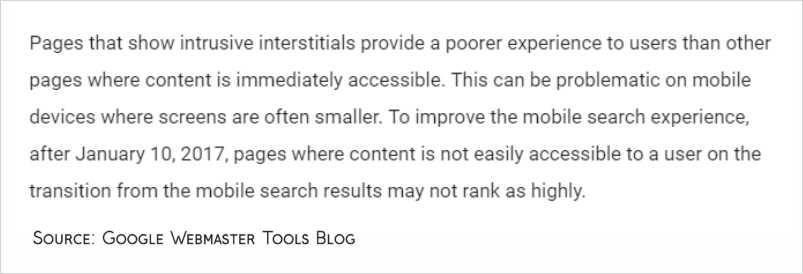Google Penalizes Annoying Pop-Ups In Search By Susan Stern – Omaha Marketing Firm Consultant
By Susan Stern – Omaha Marketing Firm Consultant
(OMAHA, Nebraska) – Stern PR – In step with its dedication to improving the mobile user experience, Google rolled out a mobile search penalty for intrusive pop ups called Interstituals that launch at page start up.
Interstituals tend to tick off website visitors. The pop up blocks page content until a user clicks the ‘X’ to dismiss or waits for a count down. The delay in accessing main content is what Google’s mobile rank juice penalty targets.
Popular news sites, for instance, tend to use a lot of interstituals. Advertisers (merchants & brands) tend to prefer these intrusive pop ups for high engagement and conversion rates (from looker to buyer). Publishers (ad agencies & mobile ad networks) like them for the high revenue potential over banner ads which users tend to overlook nowadays in a phenomenon know as ‘banner blindness.’
Not All Pop Ups Penalized
Google’s new mobile ranking signal doesn’t impact all page load pop ups. Websites can use full-screen interstitual legal disclaimers at page start up to verify age. On sites containing nudity or graphic violence, a full page age verification pop up that blocks main content makes sense – and is excluded from Google’s mobile search penalty.
While page load pop ups seeking visitor acceptance of tracking cookies appears acceptable, a small sized banner, in most cases, suffices. In total, Google’s examples imply that the majority of acceptable banners deployed at page start up should allow a reader to view main content, be small in size, and perhaps, not cover more than 15% of mobile screen.
Since search engine position on mobile should be a top concern of any brand, content marketers should re-evaluate advertising strategy, dump interstituals at page start up, and switch to smaller-size banner pop ups like these :
Google made no mention of penalizing mobile search of websites using exit pop ups: interstituals that run as you attempt to exit a website. The webmaster’s blog also declined to elaborate on using full or partial page pop ups after a visitor has read spent considerable time on a website or simply read a website article – remains unclear. To be safe, webmasters might want to discard all content blocking ads, as a precaution.
Google Could Do More
Google’s mobile search ranking of websites running content-blocking pop ups marks a positive, consumer-focused first step to curtail intrusive online advertising on smart phones. Google, however, can do a heck of a lot more. Why not widen the ranking signal penalty to desktop searches? Why not punish sites that deliver auto-playing video ads with sound? Or how about a penalty for pop-ins that force visitors to scroll up – to push the ad off the screen?
Certainly brand advertisers and ad publishers would object to additional Google penalties. What is more important? Sacrificing quality for ad revenue OR delivering a better user experience?
While most ad agencies would vehemently oppose deeper Google search penalties of ads that annoy and frustrate visitors, Stern PR Marketing in Omaha thinks a consumer-focused approach – is the right way to go. We point to The Coalition for Better Ads for guidance.
The organization surveyed 25,000 internet users in North American and Europe and identified “the least preferred, most annoying ad experiences that are also most likely to cause consumers to adopt ad blockers.”
Download a PDF here of the online ads that “fall below the threshold of consumer acceptability.” Meantime, after you’ve perused the list of annoying ads people universally detest on mobile and desktop, brands should seriously re-group, re-think and re-strategize their online advertising techniques.
Pop Ups. Annoy. Brands should take heed.
In addition, we wish reputable news organizations like CNN and Foxnews would dump those click-bait Outbrain ads that cheapen their websites and images. That’s a subject for another article.
